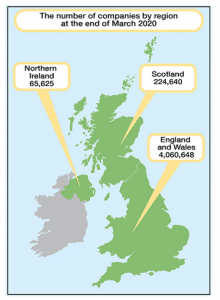
What can UK company registration statistics tell us about the Economy.
Every quarter Companies House the UK Government office that handles the filing of company accounts in the UK publishes a release of company registration statistics.
The release contains useful information about the total number of companies on the official registry but also the effective number which is the number of companies that are not going through dissolution or insolvency.
Summary as at September 2019
The Key points that come out of the latest release at the end of October 2019.Between July and September 2019, there were 169,751 new incorporations and 129,795 dissolutions in the UK. In contrast to the recent trends, the number of dissolutions is lower in the third quarter than the previous quarter, while the number of incorporations has remained stable.
This indicates that whilst there are evident concerns about the economy in the national press there remains a good level of economic activity in that there are a net around 40,000 new company formation, once incorporations and dissolutions are netted off. At the end of September 2019, there were 4,279,972 companies on the total register and 4,008,335 on the effective register. Both the total and effective registers continue to increase in size, although the growth rate has slowed in recent years.
Having a total number of corporations over 4million is an indication of the progressive growth in the economy and this coupled with the steady reductions in unemployment suggest an economy that is becoming more entrepreneurial and moving closer to the desirable position of full employment which is usually indicated by the number of unemployed being equal to the number of job vacancies. This is the first quarter where the effective register size has exceeded four million companies.
This is a good indication of a strong and growing economy. Consistent with the recent trend in previous years, there were more incorporations in the third quarter of 2019 than in the same period a year ago. A year on year indication is another good statistic.
Dissolutions have declined compared to the same quarter of the previous year for the first time since 2012.
UK Company Register 2012 - 2019 as reported by Companies house.

See the above graph source - Companies house
This release from companies house provides information on the size of the company population and the changes that have occurred within the quarter. The release includes statistics for the United Kingdom, England and Wales, Northern Ireland, and Scotland. The statistics cover companies, which are specific legal forms of businesses that are registered at Companies House. They do not include information on sole proprietorship businesses, partnerships, and charities. This latest release is overall a good indication of the state of the economy and is in interesting contrast when compared to the more pessimistic tone set by the national press.
Summary at March 2020
Updating this data in March 2020, not surprisingly the growth trend has slowed down.
The total register size at the end of March 2020 was 4,350,913, an increase of 3.5% when compared with the end of March 2019 .Between 2018 to 2019 and 2019 to 2020, register growth has slowed (3.5%) when compared with the average growth of the previous 5 years (5.3%).
There were 665,495 company incorporations in 2019 to 2020. Whilst this is a decrease of 1.1% when compared with 2018 to 2019, it’s the second highest number of incorporations since UK figures were first reported, in 2009 to 2010. The decrease mainly relates to there being an unusually high number of incorporations during 2018 to 2019

Picture credit : Companies register activities, 2019 to 2020, Companies House.
During 2019 to 2020, there were 665,495 new company incorporations, that represents a a year on year decrease of 1.1%. It is however worth noting, however, that during the previous year, there were an unusually high number of incorporations. When comparing 2019 to 2020 with 2017 to 2018, the number of incorporations increased by 45,210 (7.3%).
However, during March 2020, there was also a noticeable decrease in the number of incorporations compared with March 2018. The observed decrease in March 2020 coincides with the emergence of the coronavirus (COVID-19) pandemic.
At the end of March 2020, incorporations decreased by 7,069 (1.1%) in England and Wales when compared with the previous year, whilst Scotland decreased by 731 (2.2%). Northern Ireland saw the only percentage increase of 5.0%, an increase of 405 incorporations.
In the same year, there were 536,934 dissolutions, an increase of 5.5% compared with 2018 to 2019. However, during March 2020, there was a considerable increase in dissolutions when compared with March 2019. This increase also coincides with the emergence of the coronavirus (COVID-19) pandemic. The UK entered a national lockdown only in the last week of March, so I would expect a decrease overall during April due to the absence of new registrations. It will be interesting to study the UK data and compare it with other countries such as Australia which have so far faired better than the UK.
It is likely that the slow down will continue through until September 2020 as Covid has greatly reduced UK economic activity across all sectors.
Picture credit : Companies register activities, 2019 to 2020, Companies House.
We expect activity levels to return to more like normal levels from January 2021 onwards, there is good reason to think that a vaccine will be widely available by then. That will have meant nearly a whole year of disruption to the UK economy. That said the epidemic is a worldwide pandemic and all countries are suffering to varying degrees and extents.
Sources
Companies house official statistics release summary
Companies house blog - blog from the companies house team
Bio - Adrian is the CEO of Reporting Accounts and regular contributor to this blog, see also his posts around the web including on Linkedin



